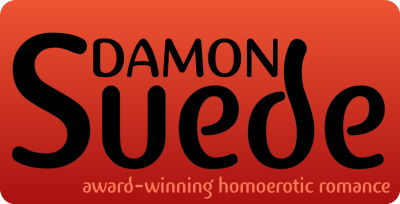Imperfect Words: the unfathomable power of placeholders
by Damon Suede
Sing O Muse of the Glory of Placeholders!
Praise be to the power the not-quite word, the crappy quick fix, and
the iffy character name!
Raise your hand if you ever sat for longer than
10 seconds straining for the perfect turn of phrase. It's only
human.
In her legendary
Bird by Bird, Anne Lamott
devotes an entire chapter she titles “Shitty First Drafts” to the
power of placeholders to keep the internal editor at bay while you
put words on the page regardless of quality. Trouble is, writing and
revision use completely different portions of the human mind: the
Muse and the Editor. Mostly they loathe and impede each other.
Perfectionism paralyzes.
That's not to say I don't believe in good
writing, but rather that good writing doesn't happen automagically.
Everything starts with crap.
Fiction is inherently internal, personal,
subjective. Inviting an audience to muck around inside your
imagination for hours at a stretch requires a measure of hubris and
insanity. Of course we want to dazzle our readers. Of course we want
to live up to our literary forebears. Of course we secretly fear
exposure. We get paid to tell lies for living.
I love placeholders.
I originally discovered the power of
placeholders in show business. Backstage during a performance
there's no time to worry about perfect solutions; duct tape and
improv keep shows on the road. On film sets it's even worse when
you're spending a meant every minute, dithering and second guessing
decisions can bankrupt a production company.
The same holds true for romance fiction,
although the traps are more subtle. When you read a great novel you
may be able to convince yourself it came out perfectly the first
time. It's easy to forget all the people contributing to the success
of a great story brought to market.
Are there moments where divine fire funders
through your fingers onto the page? Yeah, sure. But you can't build
a career out of lightning strikes. A professional writer needs a
toolkit capable of handling digression, crisis, and disappointment
for their sanity and solvency.
The greatest of these is the magical
placeholder.
A placeholder requires no thought, no anxiety,
and no wasted time. Once you train yourself to embrace placeholders,
you'll develop a system for flagging things that need your attention
when the muse does a runner, and it's time for the editor to come
out to play. When people tell you that writing is rewriting they're
tacitly urging you to love the kinds of quick fixes, silly
Band-Aids, and scotch-tape miracles that keep your story chugging
along in full view.
Yes, research. Yes, preparation. Yes,
structure. But above all things you must catch those wild words on
the hoof and nail them to the paper. As Nora Roberts always says,
"you cannot edit a blank page."
In a sense, perfectionism is a kind of
crippling performance anxiety and renders you just as impotent at
the moment of truth . The more you grunt and strain for the effect
you think you want, the more you block and mangle real inspiration
and artistry. At its best, writing feels effortless and radiant. How
on earth do we expect willful constipation and paralysis to
illuminate anything?
Nothing comes out perfect the first time. The
entire challenge of writing is a kind of alchemical purification
that elevates lead to literary gold.
Solve et coagulo, baby!
In the length of time it takes you to come up
with the perfect adjective, the exact joke, the ideal name for your
protagonist, you could have barf up three or four pages which only
require a little TLC to sparkle.
Over time you'll learn the traps you set for
yourself. Maybe you suck at titles. Maybe choreographing sex scenes
freezes you solid. Maybe your nervous tic is renaming your main
characters every seven pages. All of those are the Editor sabotaging
the Muse.
Once you know your particular bugaboo, you'll
bring the right set of placeholders to work with you every day. The
moment you feel the big dither take hold or you start second
guessing a turn of phrase while you're in flow, without a
handy-dandy placeholder and stick it where it fits. Even better, as
you do it remind yourself, "I love a great placeholder," before the
Editor tries to convince you the right word is on the tip of your
tongue. It is, but later.
Think of it another way: no one builds a
monument from scratch. They sketch, they model, they hire a team,
and they run ideas past the right departments when it's appropriate.
The vision is theirs but the revision is shared. The same is true of
your writing let your creative self sow a wild garden and then let
your practical self come back later to weed, clip, and mulch the
beds. Working that way lets the Muse and the Editor work to the best
of their abilities in tandem, in solitude.

Originally published as a lecture for Romance University.
If you wish to republish this article, just drop me a line.

